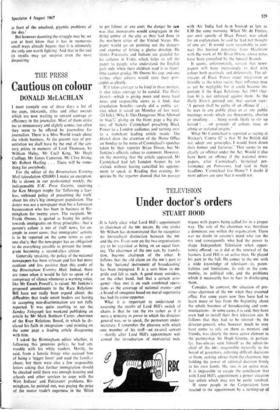Cautious on colour
THE PRESS DONALD McLACHLAN
I must compile one of these days a list of the cups, inkstands, titles and other awards which are now waiting to reward courage or efficiency in the journalist. Most of them strike me as unnecessary and slightly comic; too often they seem to be offered by journalists for journalists. There is a Miss World touch about the whole business. At the present rate of pre- sentation we shall have by the end of the cen- tury prizes in memory of Lord Thomson, Sir William Haley, Mr Cecil King, Mr Hugh Cudlipp, Mr James Cameron, Mr Clive Irving, Mr Robert Harling . . . There will be some- thing for everybody.
For the editor of the Birmingham Evening Mail (circulation 420,000) I make an exception. He is shown in our professional weekly, the indispensable U.K. Press Gazette, receiving the Ken Morgan trophy for 'following a fear- less, unbiased policy of presenting the truth' about his city's big immigrant population. The donor was not a newspaper man but a Jamaican businessman who has been in business in Bir- mingham for twenty years. The recipient. Mr Frank Owens, is quoted as basing his policy towards immigrants on three principles: that a person's colour is not of itself news, for ex- ample in court cases; that immigrants' activity is to be reported on the same terms as any- one else's; that the newspaper has an obligation to do everything possible to prevent the immi- grant becoming a second-class citizen.
Generally speaking, the policy of the national newspapers has been tolerant and fair but more cautious and less positive than this credo of the Birmingham Evening Mail. Indeed, there are times when it would be fair to speak of a conspiracy of silence whenever a warning voice, like Mr Enoch Powell's, is raised. Mr Jenkins's proposed amendments to the Race Relations Bill have not really been argued about; the difficulties that trade union leaders are having in accepting non-discrimination are not fully reported. It was quite startling to see the Sunday Telegraph last weekend publishing an article by Mr Mark Bonham Carter, chairman of the Race Relations Board, in which he de- clared his faith in integration—and printing on the same page a leading article disagreeing with him.
I asked the Birmingham editor whether, in following this generous policy, he had any trouble with his white readers. Mostly, he said, from a lunatic fringe who accused him of being a 'nigger lover' and used the familiar abuse; but there were also a few responsible letters asking that further immigration should be checked until there was enough housing and schools and other services to cope with the West Indians' and Pakistanis' problems. Bir- mingham, he pointed out, was paying the price of the motor trade's eagerness in the 'fifties to get labour at any cost; the danger he saw was that immigrants would congregate in the dying centre of the city as they had done in the northern cities of the United States. His paper would go on pointing out the dangers and expense of letting a ghetto develop. He thinks Pakistanis and Indians are grateful for his column in Urdu, which helps to sell the paper to people who understand the English part only when their children read it to them! One cannot grudge Mr Owens his cup. and one wishes other editors would state their prin. ,ciples as clearly.
If it takes courage to be kind in these matters. it also takes courage to be candid. The Drily Sketch—which is giving more and more hard news and responsible views as it finds that circulation benefits—surely did a public ser- vice when it asked on Monday of last week (24 July). 'Why Is This Dangerous Man Allowed to Stay?: giving on the front page a big pic- ture of Stokely Carmichael preaching Black Power to a London audience, and turning over to a trenchant leading article inside. The iSketch drew the attention of the Home Office on Sunday to the notes of Carmichael's speeches taken by their reporter Brian Dixon, but Mr Jenkins's officials refuse to comment. However. on the morning that the article appeared, Mr Carmichael had left London Airport by ten o'clock without having cancelled his appoint- . ment to speak at Reading that evening. In- quiries by the reporter showed that his passage
with -Air India had bem booked as late as 8.30 the same morning. When Mr de Freitas, our own apostle of Black Power, was asked for an explanation, he said he 'had not thought of one yet.' It would seem reasonable to con- nect this hurried departure from Heathrow with the work of Mr Brian Dixon. chose notes have been consulted by the Special Branch.
It seems. unfortunately, certain that news- papers will have increasingly to deal with colour both positively and defensively. The ad- vocates of Black Power reject integration as fervidly as the white racist; their influence may as yet be negligible but it could become im- portant if the Race Relations Act 1965 (Sec- tion 6) is not enforced against them. As the Daily Sketch pointed out, that section says: 'A person shall be guilty of an offence if . . . he uses in any public place or at any public meetings words which are threatening, abusive or insulting . . . being words likely to stir up hatred . . on grounds of colour, race, Or ethnic or national origins.'
What Mr Carmichael is reported as saying at Wesker's 'Centre 42' is that 'If the British did not adopt our principles, I would burn down their homes and factories.' That seems to me clearly an-offence under the Act. Would it also have been an offence if the national news- papers, after Carmichael's hysterical per- formance on Panorama. had said in their headlines 'Carmichael Go Home'? I doubt if most editors are sure that it would not.






























 Previous page
Previous page